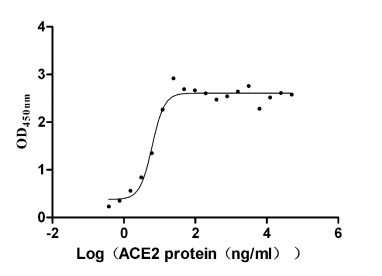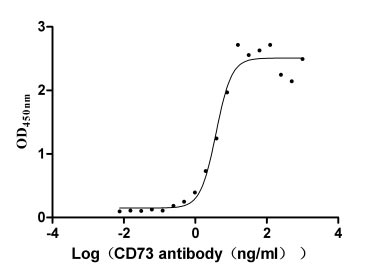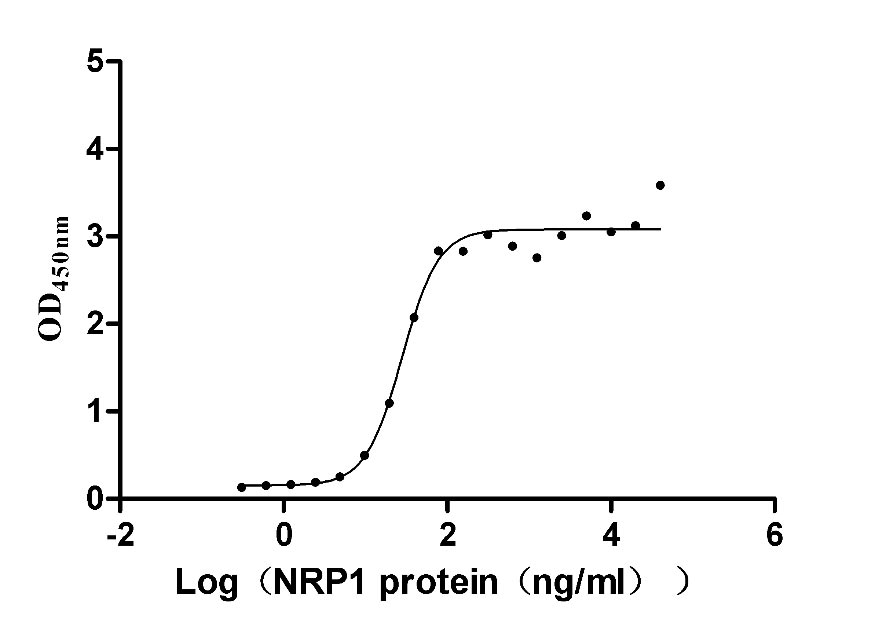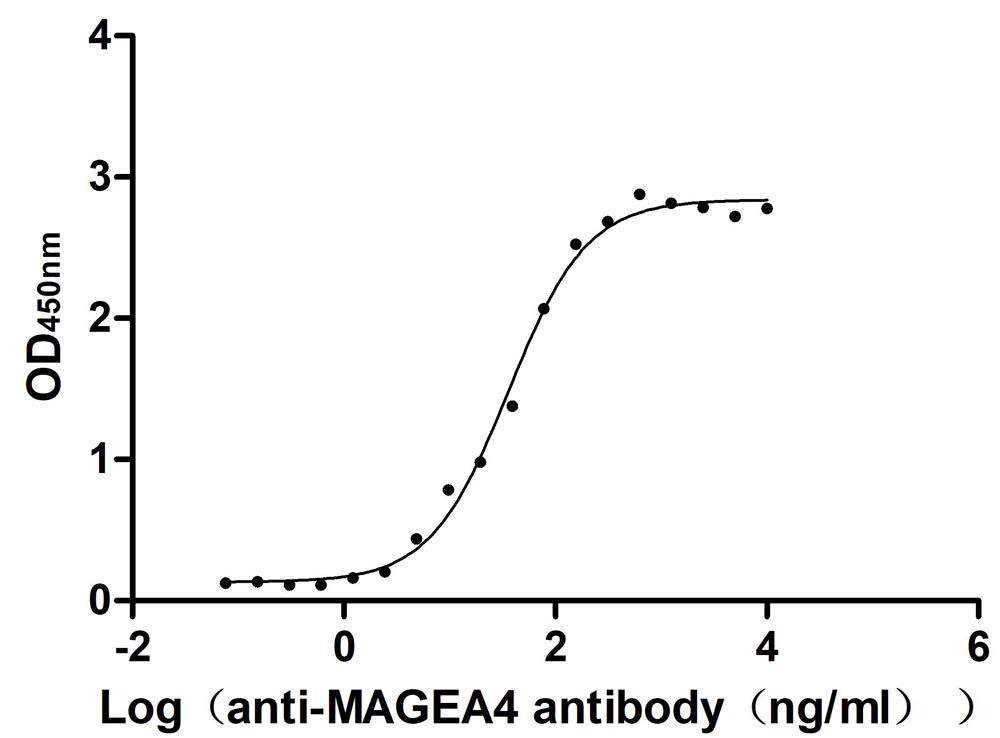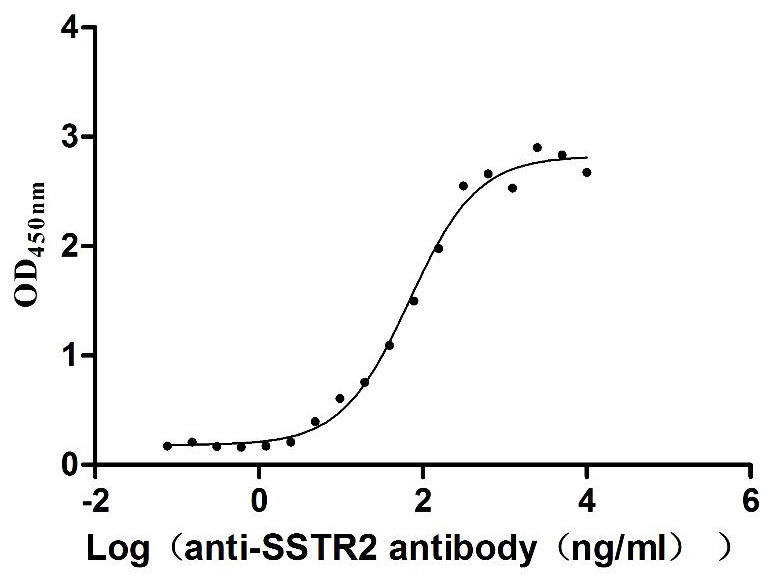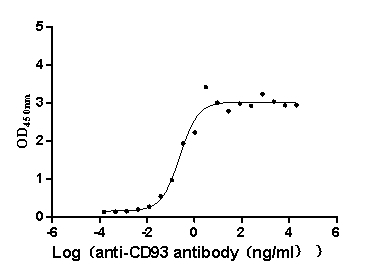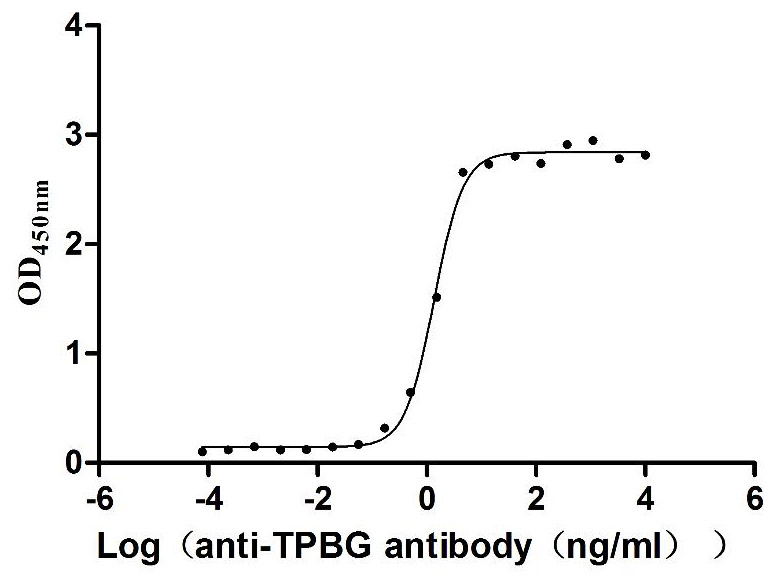Recombinant Human Lipocalin-1 (LCN1)
-
中文名称:人LCN1重组蛋白
-
货号:CSB-YP012810HU
-
规格:
-
来源:Yeast
-
其他:
-
中文名称:人LCN1重组蛋白
-
货号:CSB-EP012810HU-B
-
规格:
-
来源:E.coli
-
共轭:Avi-tag Biotinylated
E. coli biotin ligase (BirA) is highly specific in covalently attaching biotin to the 15 amino acid AviTag peptide. This recombinant protein was biotinylated in vivo by AviTag-BirA technology, which method is BriA catalyzes amide linkage between the biotin and the specific lysine of the AviTag.
-
其他:
-
中文名称:人LCN1重组蛋白
-
货号:CSB-BP012810HU
-
规格:
-
来源:Baculovirus
-
其他:
-
中文名称:人LCN1重组蛋白
-
货号:CSB-MP012810HU
-
规格:
-
来源:Mammalian cell
-
其他:
产品详情
-
纯度:>85% (SDS-PAGE)
-
基因名:LCN1
-
Uniprot No.:
-
别名:LCN1; LCN1_HUMAN; Lipocalin 1 (protein migrating faster than albumin, tear prealbumin); Lipocalin 1 like 2; Lipocalin-1; PMFA ; Tear lipocalin; Tear prealbumin; Tlc; TP; VEG protein; VEGP ; Von Ebner gland protein
-
种属:Homo sapiens (Human)
-
蛋白长度:Full Length of Mature Protein
-
表达区域:19-176
-
氨基酸序列HH LLASDEEIQD VSGTWYLKAM TVDREFPEMN LESVTPMTLT TLEGGNLEAK VTMLISGRCQ EVKAVLEKTD EPGKYTADGG KHVAYIIRSH VKDHYIFYCE GELHGKPVRG VKLVGRDPKN NLEALEDFEK AAGARGLSTE SILIPRQSET CSPGSD
-
蛋白标签:Tag type will be determined during the manufacturing process.
The tag type will be determined during production process. If you have specified tag type, please tell us and we will develop the specified tag preferentially. -
产品提供形式:Lyophilized powder
Note: We will preferentially ship the format that we have in stock, however, if you have any special requirement for the format, please remark your requirement when placing the order, we will prepare according to your demand. -
复溶:We recommend that this vial be briefly centrifuged prior to opening to bring the contents to the bottom. Please reconstitute protein in deionized sterile water to a concentration of 0.1-1.0 mg/mL.We recommend to add 5-50% of glycerol (final concentration) and aliquot for long-term storage at -20℃/-80℃. Our default final concentration of glycerol is 50%. Customers could use it as reference.
-
储存条件:Store at -20°C/-80°C upon receipt, aliquoting is necessary for mutiple use. Avoid repeated freeze-thaw cycles.
-
保质期:The shelf life is related to many factors, storage state, buffer ingredients, storage temperature and the stability of the protein itself.
Generally, the shelf life of liquid form is 6 months at -20°C/-80°C. The shelf life of lyophilized form is 12 months at -20°C/-80°C. -
货期:Delivery time may differ from different purchasing way or location, please kindly consult your local distributors for specific delivery time.Note: All of our proteins are default shipped with normal blue ice packs, if you request to ship with dry ice, please communicate with us in advance and extra fees will be charged.
-
注意事项:Repeated freezing and thawing is not recommended. Store working aliquots at 4°C for up to one week.
-
Datasheet :Please contact us to get it.
相关产品
靶点详情
-
功能:Could play a role in taste reception. Could be necessary for the concentration and delivery of sapid molecules in the gustatory system. Can bind various ligands, with chemical structures ranging from lipids and retinoids to the macrocyclic antibiotic rifampicin and even to microbial siderophores. Exhibits an extremely wide ligand pocket.
-
基因功能参考文献:
- At the relatively small concentrations in tears, all ceramides were complexed to tear lipocalin. PMID: 29331331
- Human neutrophil lipocalin (HNL) concentrations in serum or whole blood activated by formyl-methionine-leucine-phenylalanine (fMLP) were shown to distinguish acute infections of bacterial or viral cause with high accuracy. PMID: 26135974
- the possible relationship between ocular symptomatology, tear volume and tear break-up time (TBUT) and lipocalin, lactoferrin and lysozyme concentrations in the tear film were explored in a group of symptomatic dry-eyed postmenopausal (PM) women. PMID: 26366224
- Tear lysozyme, lactoferrin and lipocalin concentrations were determined via electrophoresis and the results for patients with or without eyelid tumors were compared. PMID: 25914748
- the crosstalk of dendritic cells with lipocalins alone has the potential to direct the type of immune response to these particular antigens. PMID: 26218644
- Serum concentrations of LCN1 and LCN2 were both elevated in patients with COPD. PMID: 24920892
- Tear lipocalin (TLC) is a major protein in tears and has a large ligand-binding cavity that allows the lipocalin to bind an extensive and diverse set of lipophilic molecules. PMID: 21791187
- Study has identified the first protein, lipocalin-1, in the secretome of human blastocysts that is associated with chromosome aneuploidy. PMID: 21324447
- The conserved disulfide bond of human tear lipocalin modulates conformation and lipid binding in a ligand selective manner.( PMID: 21466861
- Tear lipocalin with the bound artificial ligand 1,4-butanediol has been crystallized in space group P2(1) with four protein molecules in the asymmetric unit and its X-ray structure has been solved at 2.6 A resolution. PMID: 19770509
- The N-terminal part of recombinant human tear lipocalin/von Ebner's gland protein confers cysteine proteinase inhibition depending on the presence of the entire cystatin-like sequence motifs. PMID: 11727836
- Lcn-1 is specifically produced by corticotrophs PMID: 11850445
- LIMR mediating internalization of lipocalin-1 (Lcn-1) in NT2 cells, leading to its degradation. PMID: 12591932
- structure, function, and mechanism of action [review] PMID: 12613960
- Tear lipocalin is probable protein carrier for vitamin E tears and is candidate to specifically deliver vitamin E as antioxidant to corneal epithelium. PMID: 12613961
- Tear surface tension depends partly on presence of tear lipocalin/lipid complex. Tear proteins and lipid-free tear lipocalin lower surface tension. PMID: 12613963
- pH-driven ligand release involves ionization changes in several titratable residues associated with CD and EF loop apposition and occlusion of the calyx PMID: 15461462
- structural analysis sheds new light on the ligand binding activity of this functionally obscure but abundant human lipocalin PMID: 15489503
- Lipocalin is a novel autoantigen target in Sjogren's syndrome. PMID: 16249071
- Hydrodynamic and solution properties of lipocalin from human tears show that the protein size and topology are the major determinants of rotational correlation time and a reason for deviation from the Stokes-Einstein relationship. PMID: 17869594
- Selective displacement of ANS molecules from the ANS-apoTL complex by stearic acid discriminates the internal and external binding sites. PMID: 17945179
- Tear lipocalin is the principal endonuclease in human tear fluid. PMID: 18334931
- Results suggest that the excited protein states in tear lipocalin are not unique but consist of many substates. PMID: 19586017
显示更多
收起更多
-
亚细胞定位:Secreted.
-
蛋白家族:Calycin superfamily, Lipocalin family
-
组织特异性:Mainly expressed in lachrymal and salivary glands. Also expressed in the prostate.
-
数据库链接:
HGNC: 6525
OMIM: 151675
KEGG: hsa:3933
STRING: 9606.ENSP00000263598
UniGene: Hs.530311
Most popular with customers
-
Recombinant Paguma larvata Angiotensin-converting enzyme 2 (ACE2), partial (Active)
Express system: Mammalian cell
Species: Paguma larvata (Masked palm civet)
-
Recombinant Human 5'-nucleotidase (NT5E) (Active)
Express system: Mammalian cell
Species: Homo sapiens (Human)
-
Recombinant Human Neuropilin-1 (NRP1) (Active)
Express system: Mammalian cell
Species: Homo sapiens (Human)
-
Recombinant Human Melanoma-associated antigen 4 (MAGEA4) (Active)
Express system: Mammalian cell
Species: Homo sapiens (Human)
-
Recombinant Human Intestinal-type alkaline phosphatase (ALPI) (Active)
Express system: Mammalian cell
Species: Homo sapiens (Human)
-
Recombinant Human Somatostatin receptor type 2 (SSTR2)-VLPs (Active)
Express system: Mammalian cell
Species: Homo sapiens (Human)
-
Recombinant Macaca fascicularis CD93 molecule (CD93), partial (Active)
Express system: Mammalian cell
Species: Macaca fascicularis (Crab-eating macaque) (Cynomolgus monkey)
-
Recombinant Human Trophoblast glycoprotein (TPBG), partial (Active)
Express system: Mammalian cell
Species: Homo sapiens (Human)


